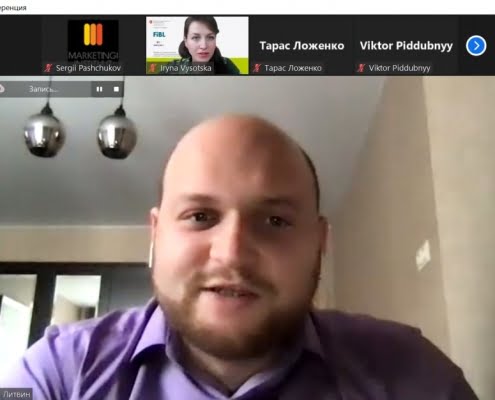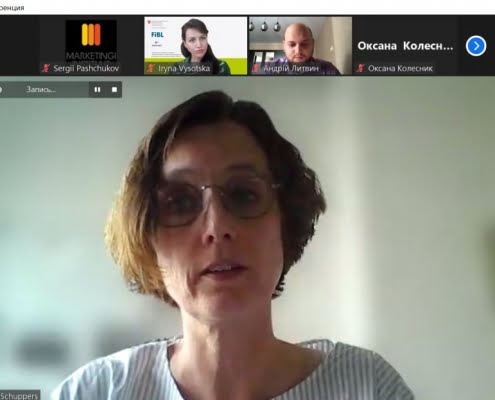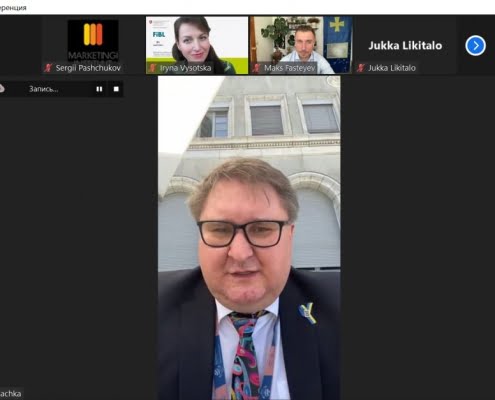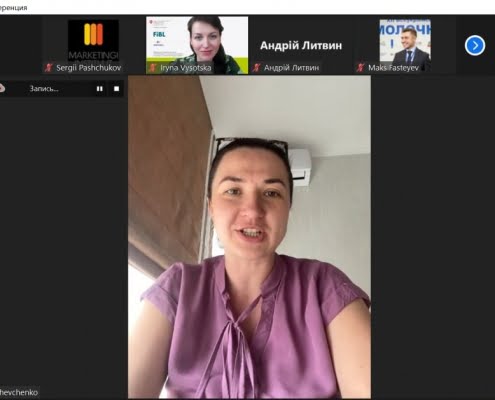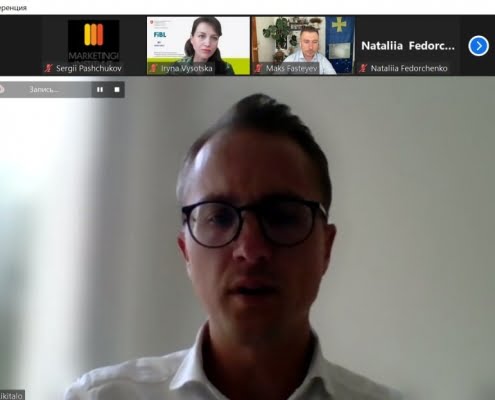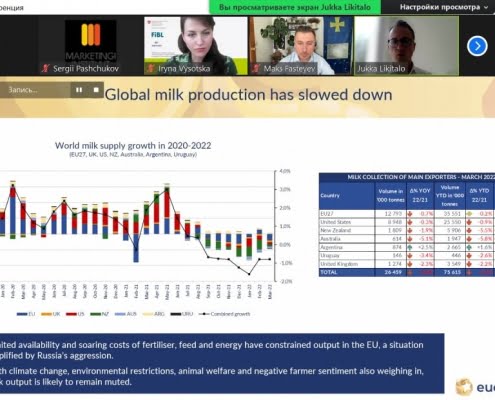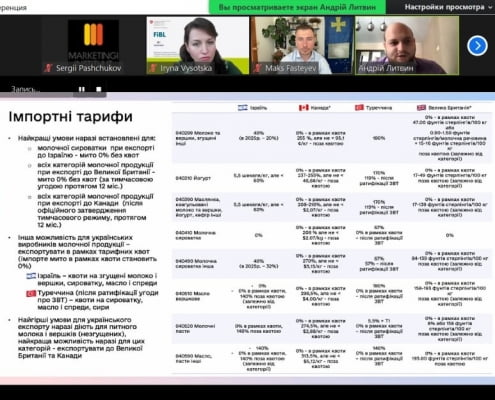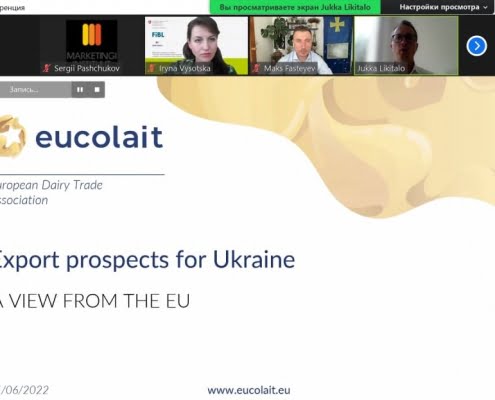On 15 June 2022, dairy producers and dairy sector stakeholders, over 70 representatives in total, met online for the 3rd expert talks to support and promote dairy export during the war. This time the discussion was devoted to the opportunities for Ukrainian exporters on the EU and global markets. The participants received up-to-date information about dairy export opportunities under the current conditions, joined the discussion of the pressing issues related to dairy export, and were able to ask the speakers their questions. According to Deputy Minister of Economy of Ukraine Taras Kachka, there is an agreement with the partners (countries that support the economic recovery of Ukraine after the russian invasion of Ukraine) to abolish tariff quotas for Ukrainian products. First of all, this is the EU decision to abolish tariff restrictions which is effective as of 4 June 2022. As a result, no import licensing will be required either. With regard to the latter the additional information is expected from the Ministry, but it is evident that import licensing will be removed for this period. This should facilitate trade in terms of organization and planning. Thus, dairy trade with the EU will be limited only by the logistical issues. Secondly, the UK has removed all tariffs on goods imported from Ukraine for one year. The agreement is bilateral and will come in force next week after ratification by the Ukrainian Parliament. Similarly, Canada has also made the decision to remove all the import duties. However, through the Central Provisional Management System, exceptions have been made for dairy and meat products. On 9 June Canada published the decision that there will be zero over-quota tariffs for the Ukrainian dairy products. According to the Deputy Minister, 12 months is not enough for the tariff removal to have a system effect for the Ukrainian business recovery, therefore, the government is working on prolonging this period. Import duty removal offers opportunities for the Ukrainian exporters on the EU markets. The Export and Entrepreneurship Promotion Office has analysed and published the comparison of Ukraine’s free trade agreements with Israel, Turkey, Canada, and the UK. For the table for comparison of import tariffs on all types of dairy products follow the link (available in Ukrainian only). According to Deputy Director of the Export and Entrepreneurship Promotion Office Andrii Lytvyn, the EU, Canada and the UK are the top markets to be considered todays. It is a great opportunity which has to be used right now. The companies which will enter these markets in time will be able to take their niches there. Meanwhile, Turkey is not a promising market, as it applies high import tariffs to dairy products, thus protecting their own producers. In addition, the UK is the biggest dairy importer globally, followed by Canada, Israel and Turkey. Israel is the biggest importer from Ukraine; in 2021 export volumes to Turkey were insignificant, and to date there has been no cooperation with the UK and Canada, which confirms significant export opportunities for the Ukrainian dairy products on these markets. During the event Vitaliy Bashynskyi, Consultant at Quality FOOD Trade Program (the Swiss-Ukrainian Project “Higher Value Added Trade from the Organic and Dairy Sector in Ukraine”) presented the procedures for inclusion of dairy FBOs’ establishments into the list of food exporters approved for export to the EU. Watch the video, presentation, and instruction with the detailed explanation of the procedures (available in Ukrainian only). In her turn, Deputy Head of the State Service of Ukraine on Food Safety and Consumer Protection Olga Schevchenko told that, as of 15 June 2022, 33 Ukrainian establishments have the right to export dairy products to the EU. Five of these establishments have been approved since the war began. “Why am I highlighting this? Because there have been opinions recently that, with the account of martial law in place, relaxation of requirements to the Ukrainian business has to be facilitated. But we have to remember that the EU procedure and requirements themselves are based on the effective EU laws and regulations. So, in fact, when an establishment is recommended for inclusion in the list no exceptions exist. There are regulations, form of certificate which the inspector signs and where he/she indicates why exactly the goods exported to the EU are compliant. In addition, these five establishments are a sign of prompt reaction and authorization by the EU. This is indicative of how quickly the EU approves our establishments, for which we have to give them credit”. The representatives of the European Association of Dairy Trade also participated in the event. Jukka Likitalo, Secretary General of Eucolait, presented the topic “Dairy Trade in the EU and World: Prospects of Ukraine from the EU Perspective”: Global dairy production has slowed down over the last 2.5 years (2020-2022); Global inflation is the cause of price growth for raw milk and stock exchange traded dairy products cannot cover the production costs. Meanwhile, price increase for final dairy products leads to drop in general demand; The EU agricultural and food policy is another limiting factor for export to the EU. This policy follows the “From Farm to Fork” principle which lead to robust and sustainable EU food system; Food security is under threat in the countries with a low level of income which are dependent on import; There have been some short-term reactions to market shocks in the EU, however, this has not led to any serious policy changes. The EU Commission declaration as of 23 March 2022 on food security states: “The current crisis lays bare the dependency of the EU food system on imported inputs, such as fossil fuels, fertiliser, feed and raw materials, confirming the necessity of a fundamental reorientation of EU agriculture and EU food systems towards sustainability, in line with the Green Deal and the reformed CAP”. In spite of attractive prices and abolishing import quotas for Ukrainian products, export to the EU remains limited due to the logistical problems. Nevertheless, the European traders are ready to increase cooperation with the Ukrainian exporters”. During the event the Export and Entrepreneurship Promotion Office presented the relevant tool for promotion of dairy products on the external markets – a catalogue of Ukrainian exporters. For the tool visit (available in Ukrainian only). In her speech Manon Schuppers, Director of SAFOSO AG (Switzerland) assured the participants that Switzerland continues to support the dairy sector of Ukraine: “Quality and safety of raw milk and dairy products is an important component of the Swiss support provided to the Ukrainian dairy sectors since 2015. In the first years of our work we placed a significant focus on the legislation. Today the Ukrainian legislation is as approximated as possible to the European one which is a substantial achievement and it will definitely help the dairy sector to promote its own export. Last year the legislative improvement was approved within the audit of the Directorate-General for Health and Food Safety DG SANTE. Another important step of Switzerland was support of the initiative to implement the Raw Milk Control Program. We are closely cooperating with the Ukrainian competent authorities and continue supporting capacity development, in particular, of state laboratories. The Raw Milk Control Program was launched 2 years ago and has had a powerful response and involvement of private sector, and, what is important, it remains operational today”. For all the materials of the third expert discussion, including speakers’ presentations and analytical bulletin, infographics and broadcast recording see link. More information about the first (available in Ukrainian only) and second events. This event was organized together with the State Enterprise “Export and Entrepreneurship Promotion Office” and analytical agency INFAGRO with support of Switzerland in the frame of the Swiss-Ukrainian Project “Higher Value Added Trade from the Organic and Dairy Sector in Ukraine” implemented by the Research Institute of Organic Agriculture (FiBL, Switzerland) in partnership with SAFOSO AG (Switzerland) www.qftp.org.

